Sitting Down For The Road
We don’t have many traditions in my family. We don’t sit around the Seder table asking questions; we don’t eat Chinese food on Christmas; we don’t have Taco Tuesdays or Gefilte Fish Fridays. We are pretty ordinary people in that sense. Or every sense.
There is one tradition that I’d like to keep and pass along to my kid – sitting down for the road.
A view of Congressman George H. Tinkham’s suitcase after his trip. © Time Inc. David E. Scherman Every time we were about to leave on a trip my Dad always said “Let’s sit down for the road” and we would set down our suitcases and sit quietly for a minute. It wasn’t my favorite thing to do – when you are a kid on the way to an exiting destination the last thing you want to do is to be stopped in your tracks and sit around even for a minute. But then again it’s a minute well-spent. You could realize you forgot something, or just look around one last time so a memory of your place will travel with you and eventually make you homesick. You could concentrate, finalize a plan, prepare for the departure, as a pilot might say revving up the engine. Many useful things you can do in a minute. Or you can just not do anything and wait for your Dad to signal that the sitting down for the road is over and open the door to something that awaits outside.
I’ve done this ever since I can remember. I sat down in places I’ve never returned to; I sat down with people who I never got to see again; I sat down before the trips I remember and many forgotten ones. Now I get to tell my kid to sit down and I like the continuity of it. It’s a real tradition, beautiful in its simplicity and as meaningful as one wants it to be.
For the road…
Continue reading →Old Photos: Education Side-by-Side
In 1958, six months after the Sputnik was launched, the Life Magazine ran an article comparing an American and a Russian student and drawing conclusions about problems with the American education system. Many of these problems are still with us today; while the Russian education is not what it used to be, the American educators are still busy making kids feel good about themselves, rather than teach, resulting in generations of students without advanced and, sometimes, basic skills.
You can read the article for yourselves and I will post just photos starting with the Russian student Alexei Kutzkov and continuing with his American Counterpart Stephen Lapekas in the next post.
Before you look at these photos, I want to point out that not all the Soviet schools in 1958 looked like this one, complete with chemical, physical and mechanical labs and not all the students were genii. Generally in Moscow everything looked better than in the rest of the country, but in every big city there were a few “show” schools, like the one I attended, happy to display the advantages of the Soviet system to the unsuspecting foreigners. Before the showtime an extraordinary amount of cleaning, scrubbing and painting occurred, combined with special deliveries of rare equipment and teaching aids; it wasn’t unheard of to serve improved lunches during the VIP visits; the school had to impress or else. Nevertheless, even without all these things the Soviet education system was one of the best in the world, not only producing world-famous scientists but maintaining high intellectual level in the rest of the population.
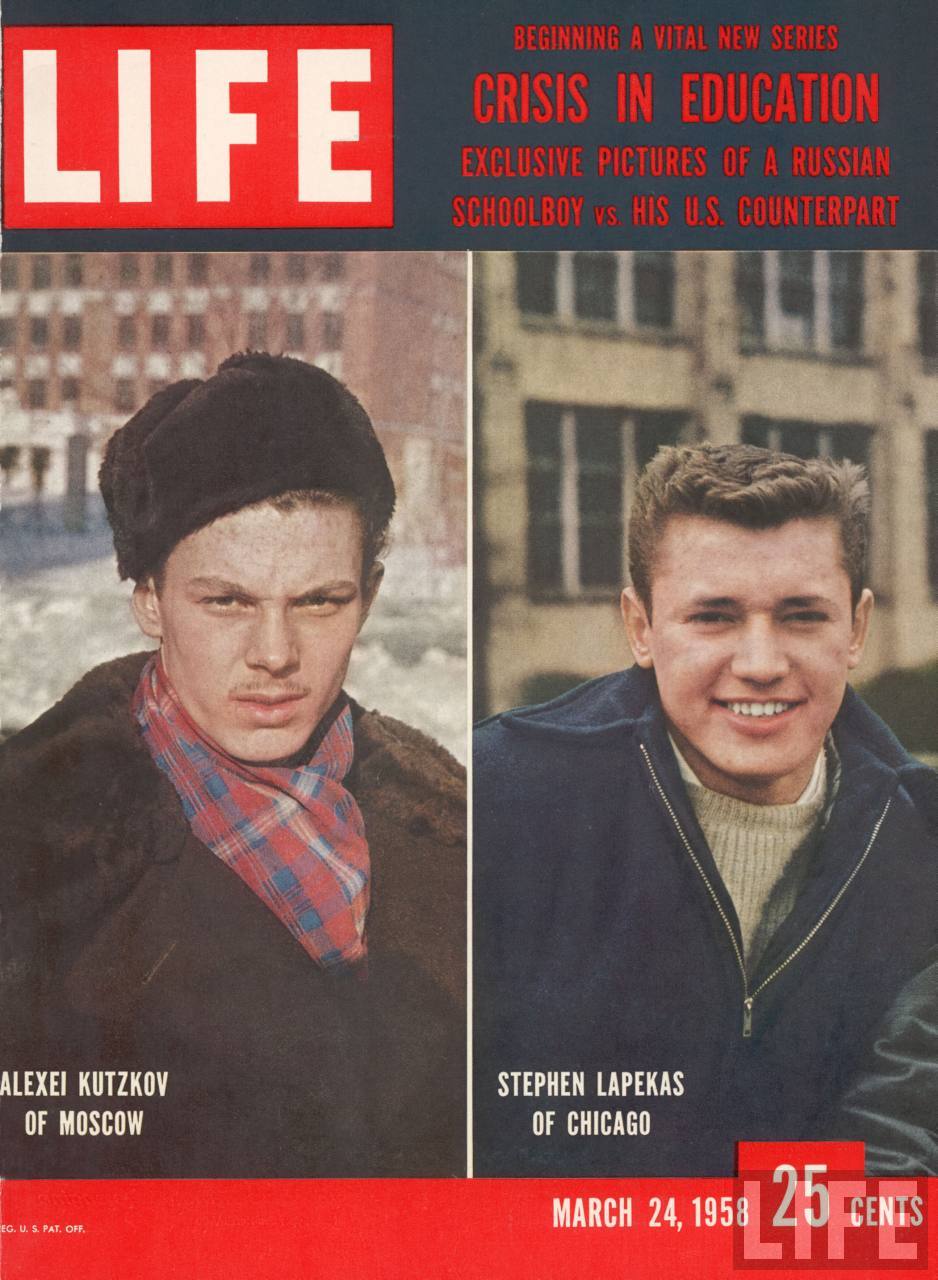
LIFE cover 03-24-1958 re. differences in Russian and American education comparing Moscow student Alexei Kutzkov (L) and his Chicago counterpart Stephen Lapekas (R) in photos by Howard Sochurek & Stan Wayman respectively.© Time 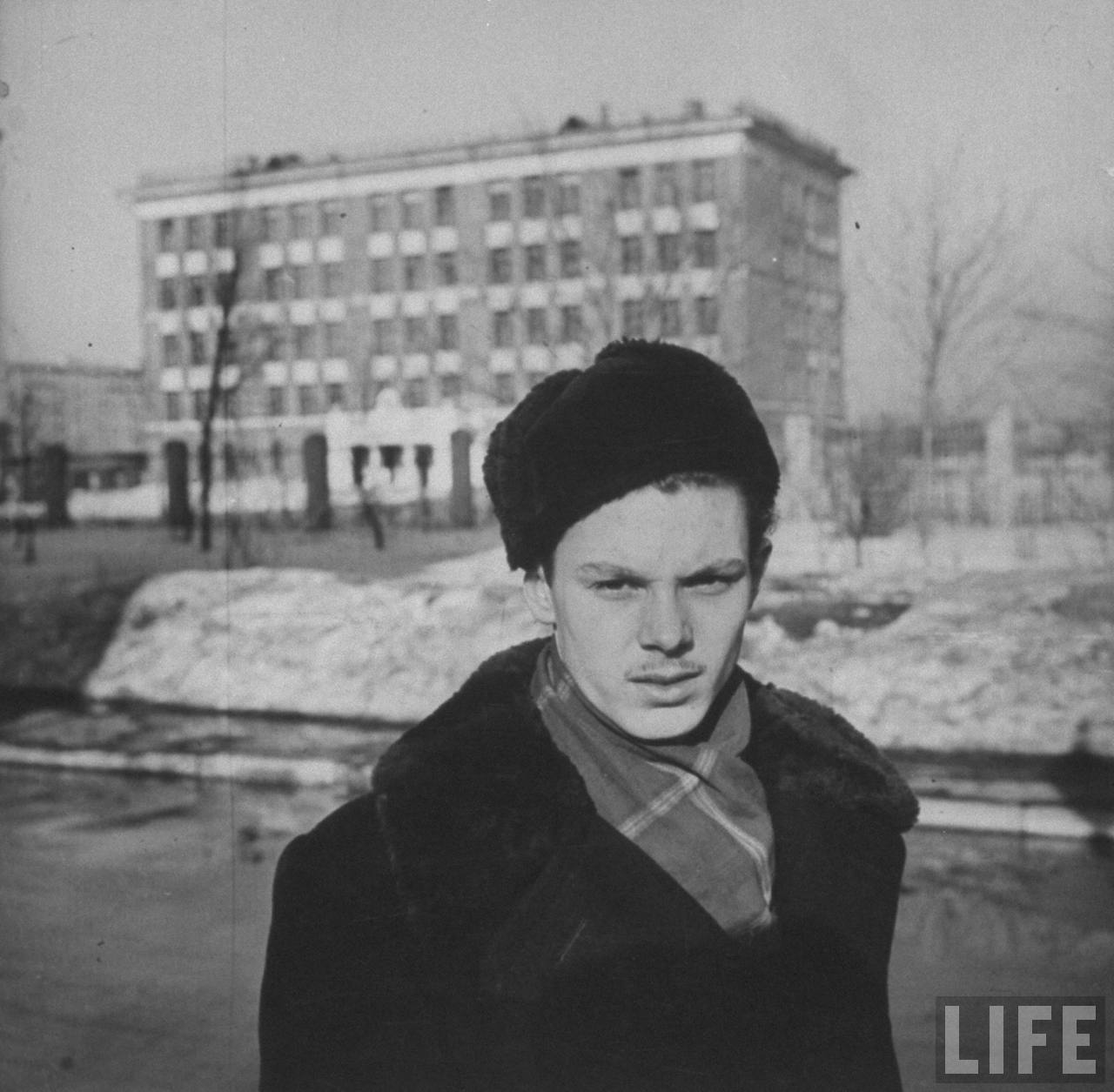
Russian high school student Alexei Kutzkov. ©Time.Howard Sochurek. 
Soviet public school student Alexei Kutzkov studying an engine in machine shop class. ©Time.Howard Sochurek. 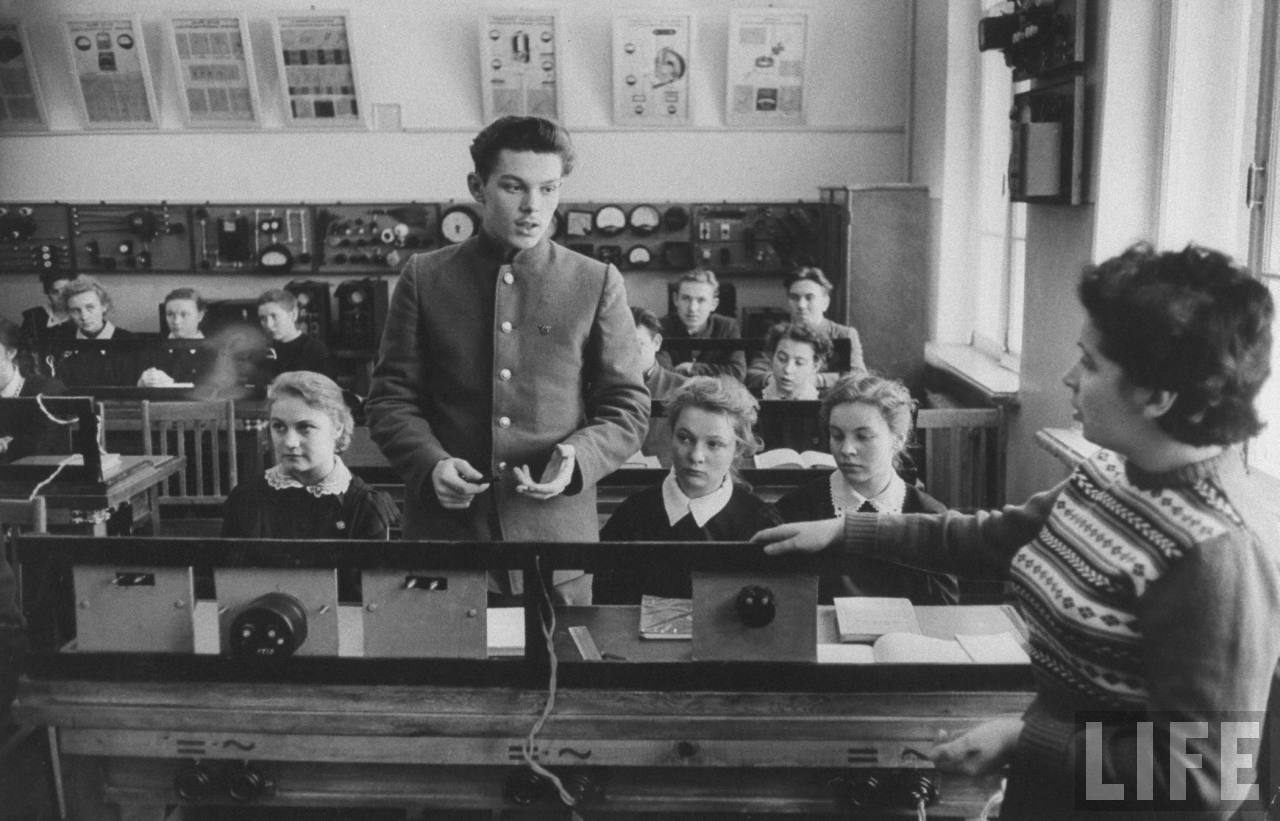
Alexei Kutzkov and other students attending class. ©Time.Howard Sochurek. 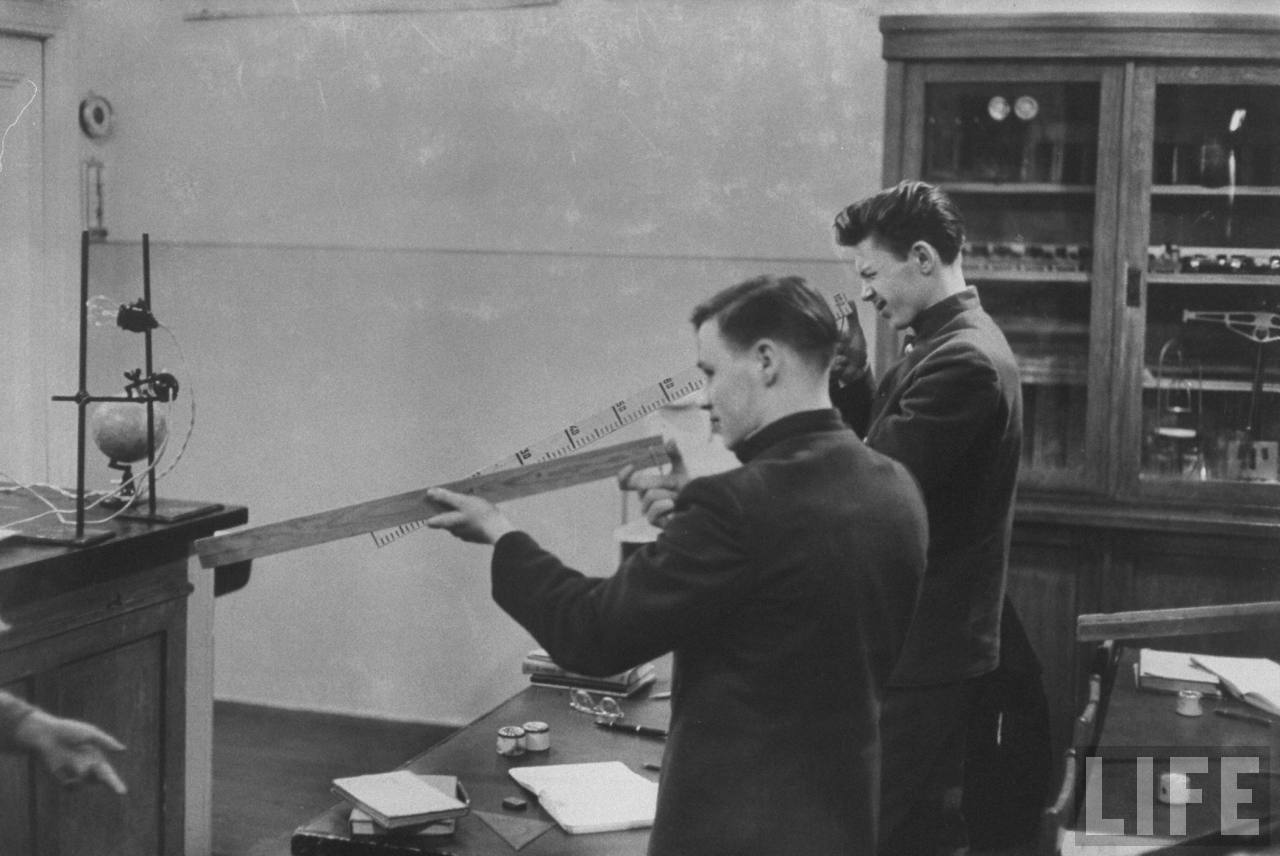
Alexei Kutzkov (C) attending physics class. ©Time.Howard Sochurek. 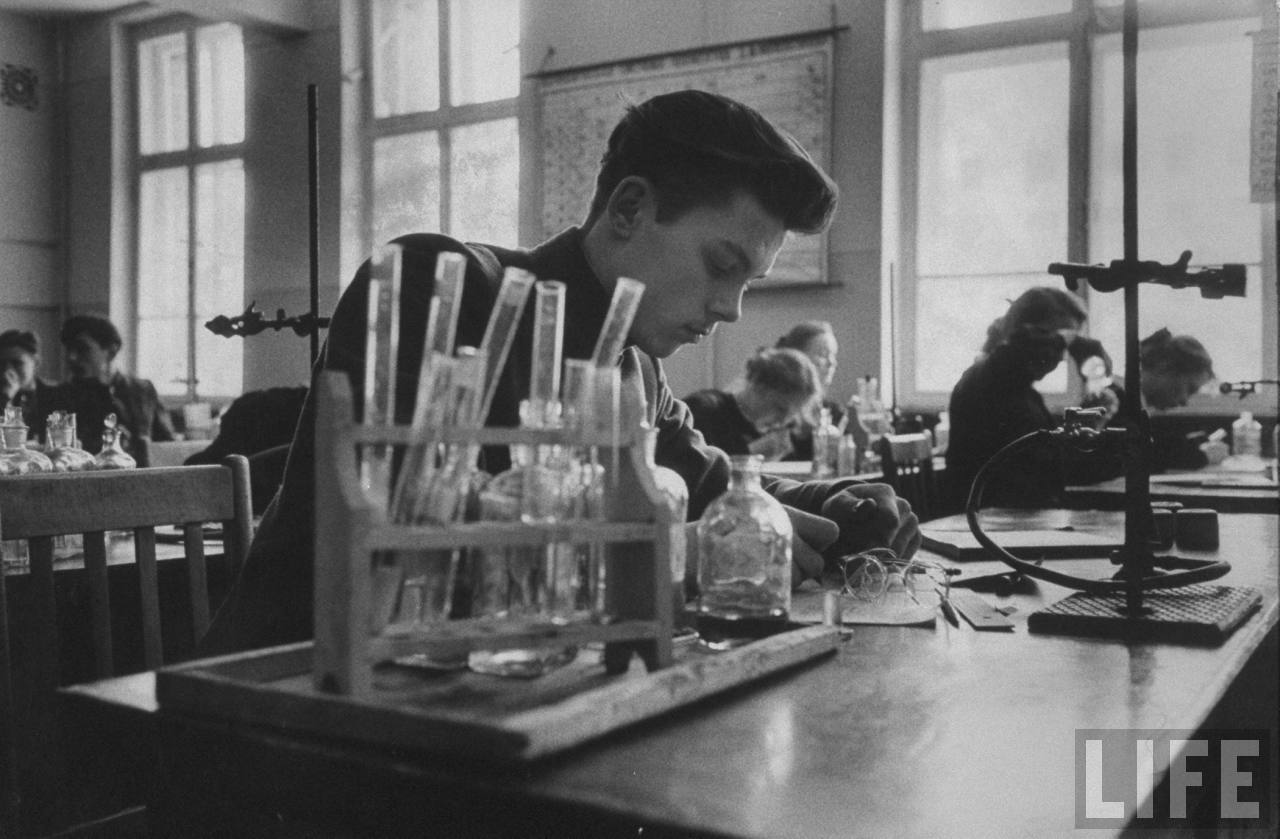
High school student Alexei Kutzkov working in chemistry class. ©Time.Howard Sochurek. 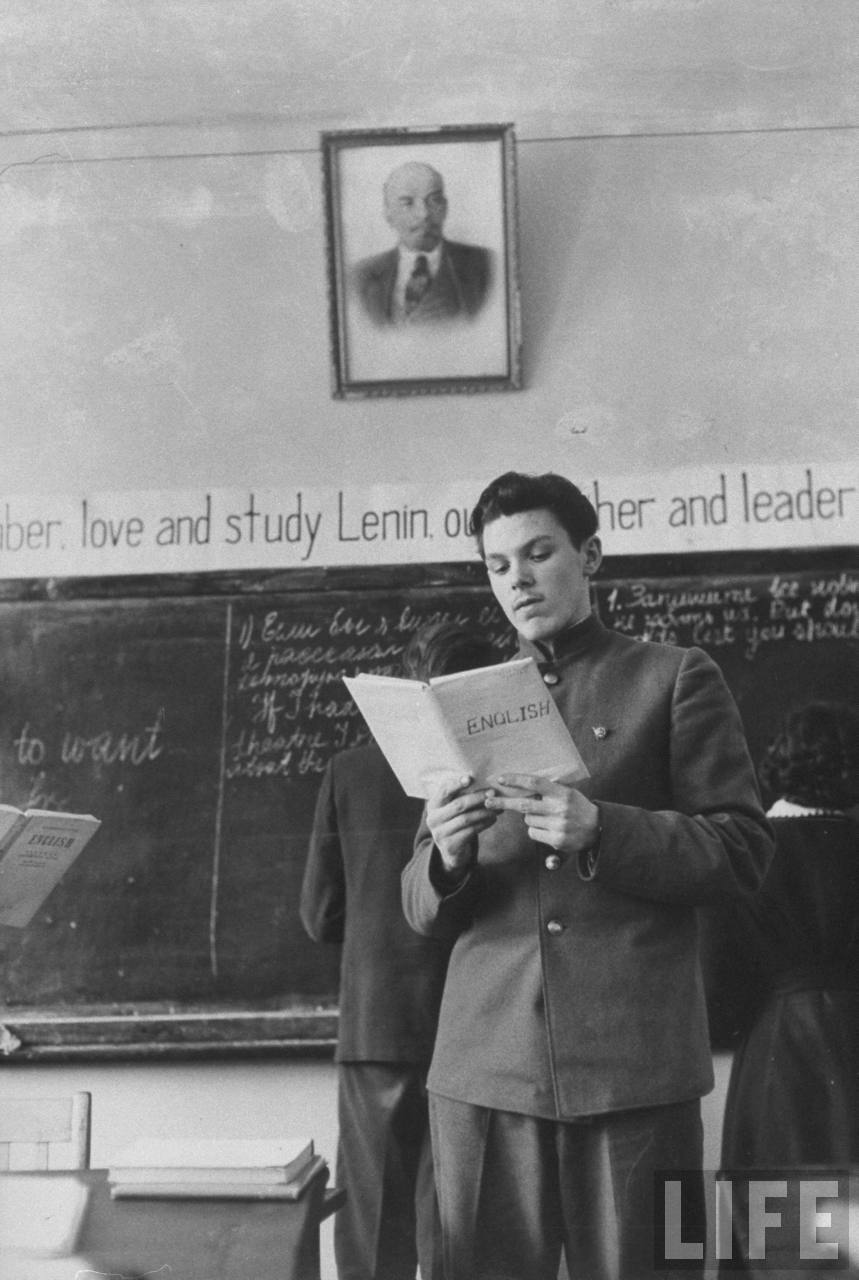
High school student Alexei Kutzkov studying English in public school. ©Time.Howard Sochurek. 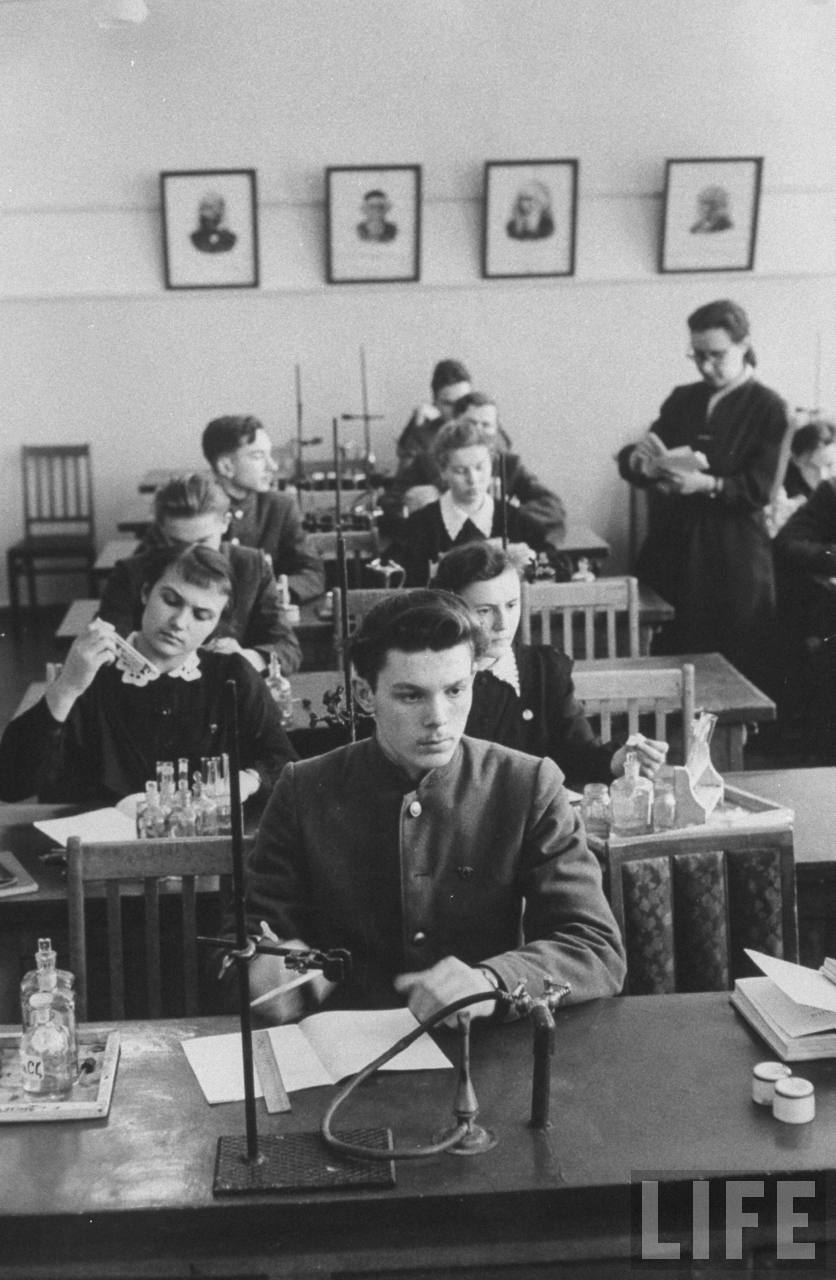
Alexei Kutzkov (C fore) and other students listening during chemistry class. ©Time.Howard Sochurek. 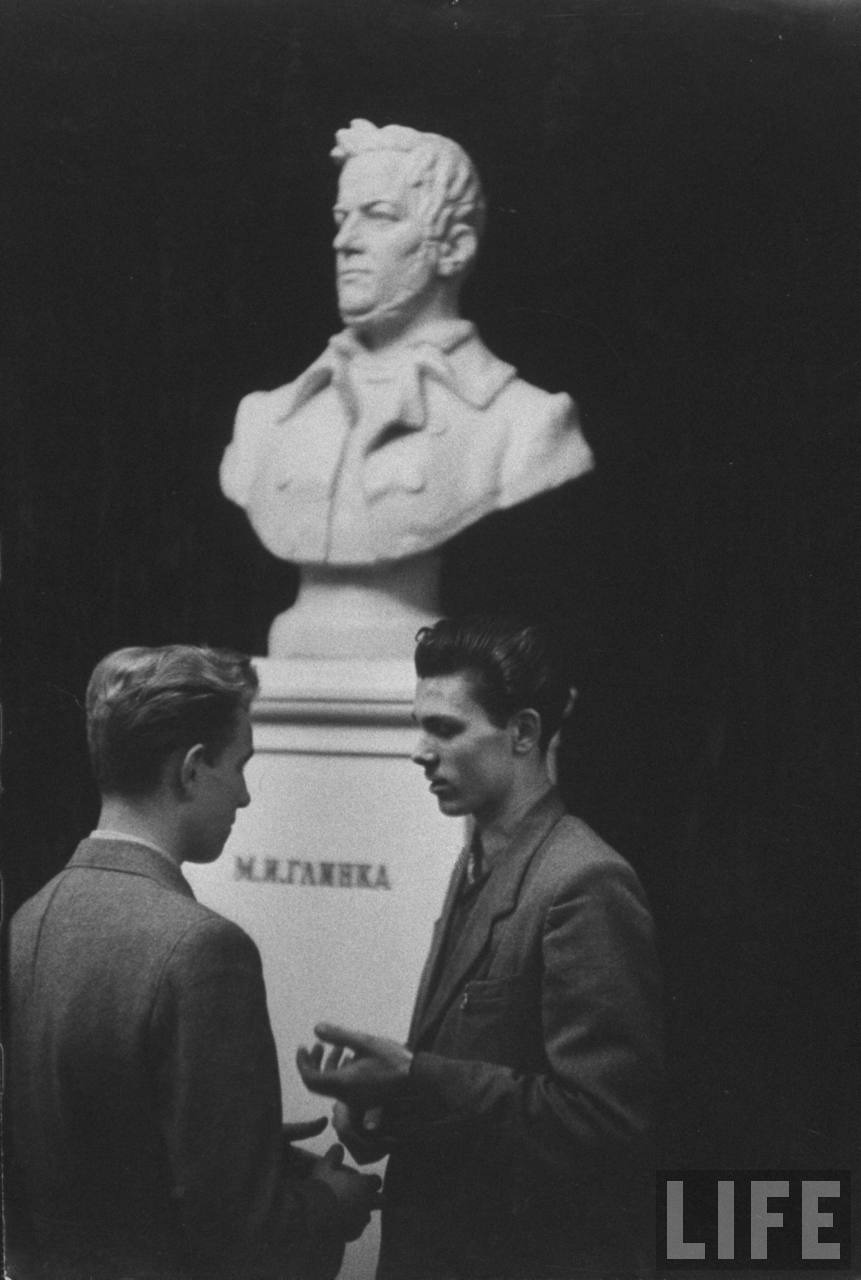
High school student Alexei Kutzkov (R) and a classmate stand beside a bust of composer Mikhail I. Glinka at the Moscow Music Conservatory. ©Time.Howard Sochurek. 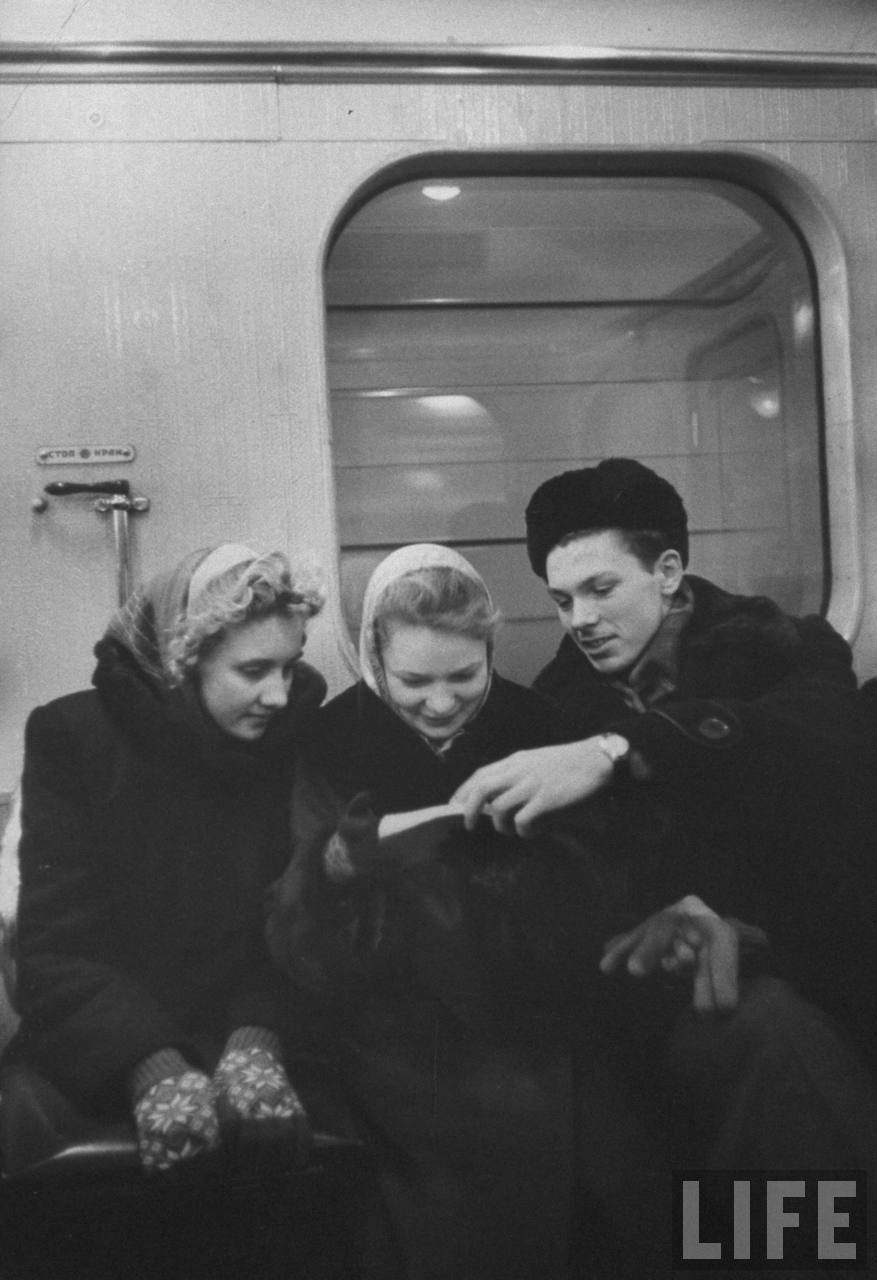
Russian high school student Alexei Kutzkov riding subway with school friends during field trip. ©Time.Howard Sochurek. 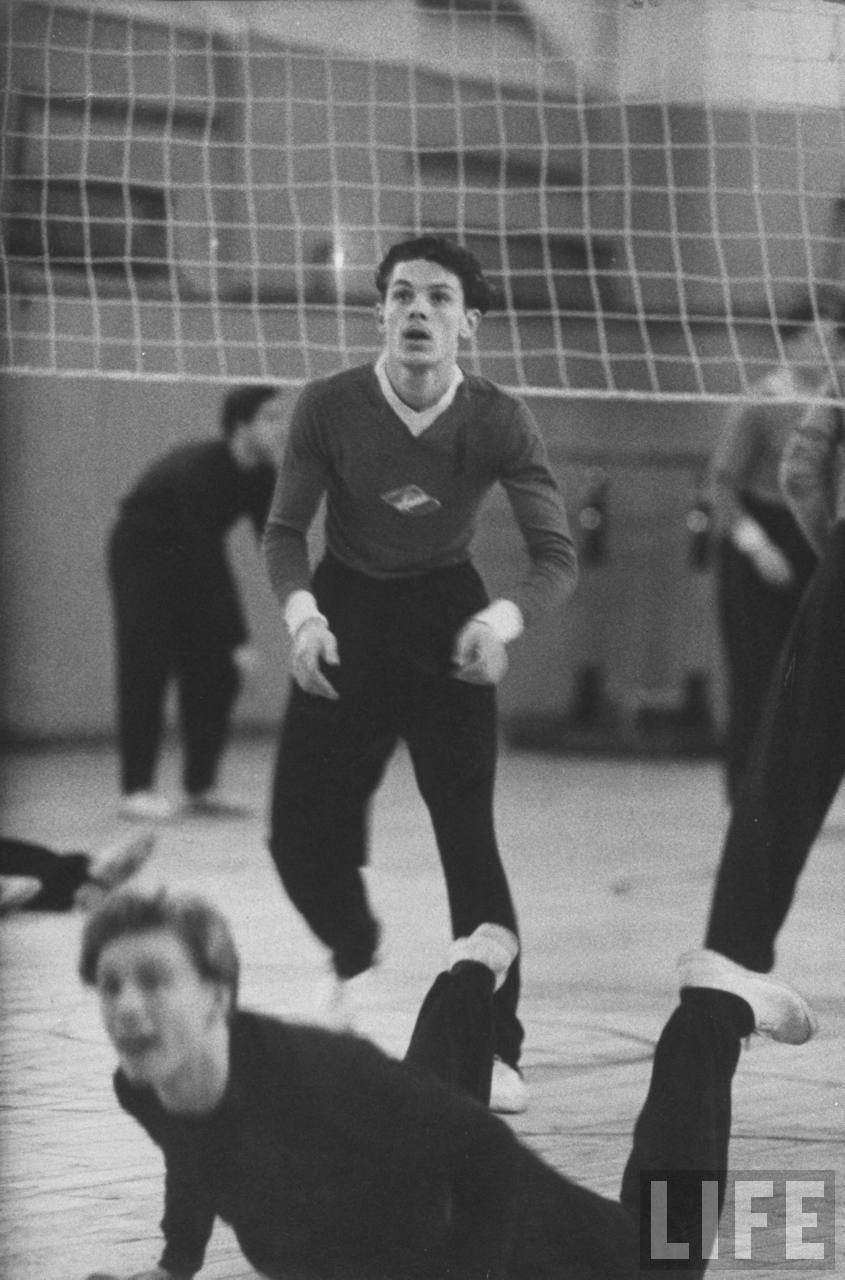
High school student Alexei Kutzkov playing in a volleyball game. ©Time.Howard Sochurek. 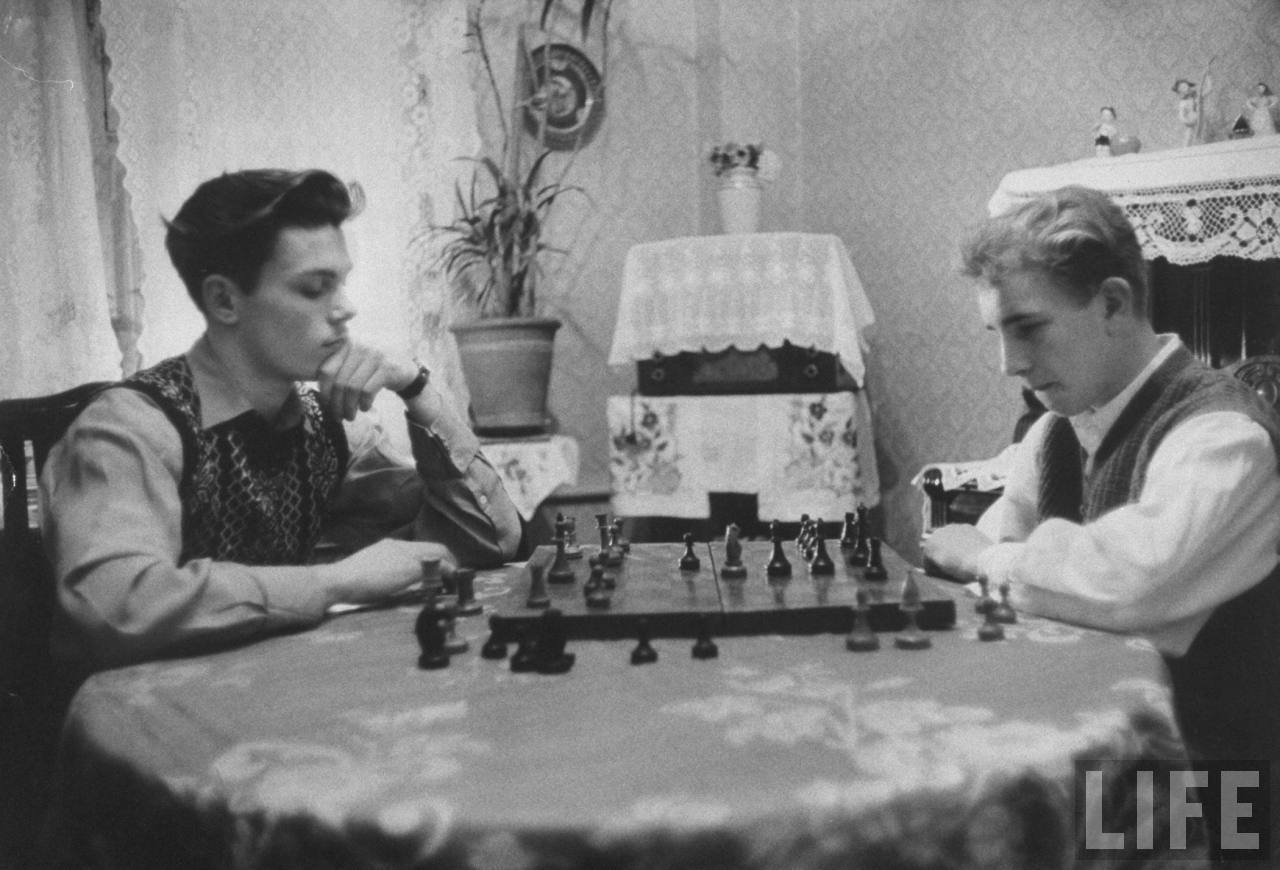
Alexei Kutzkov and Oleg Koryakovsky playing chess. ©Time.Howard Sochurek. 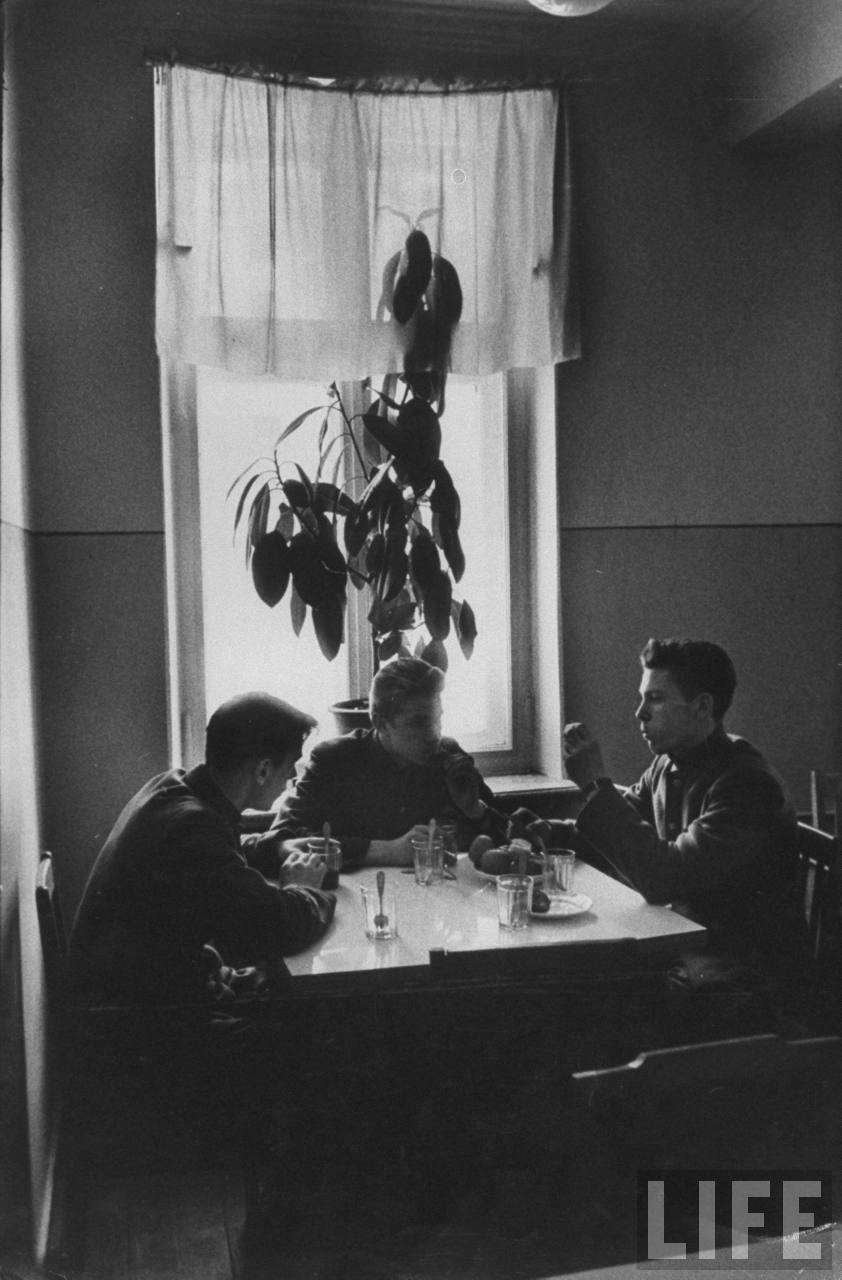
Alexei Kutzkov (R) and friends having lunch. ©Time.Howard Sochurek. 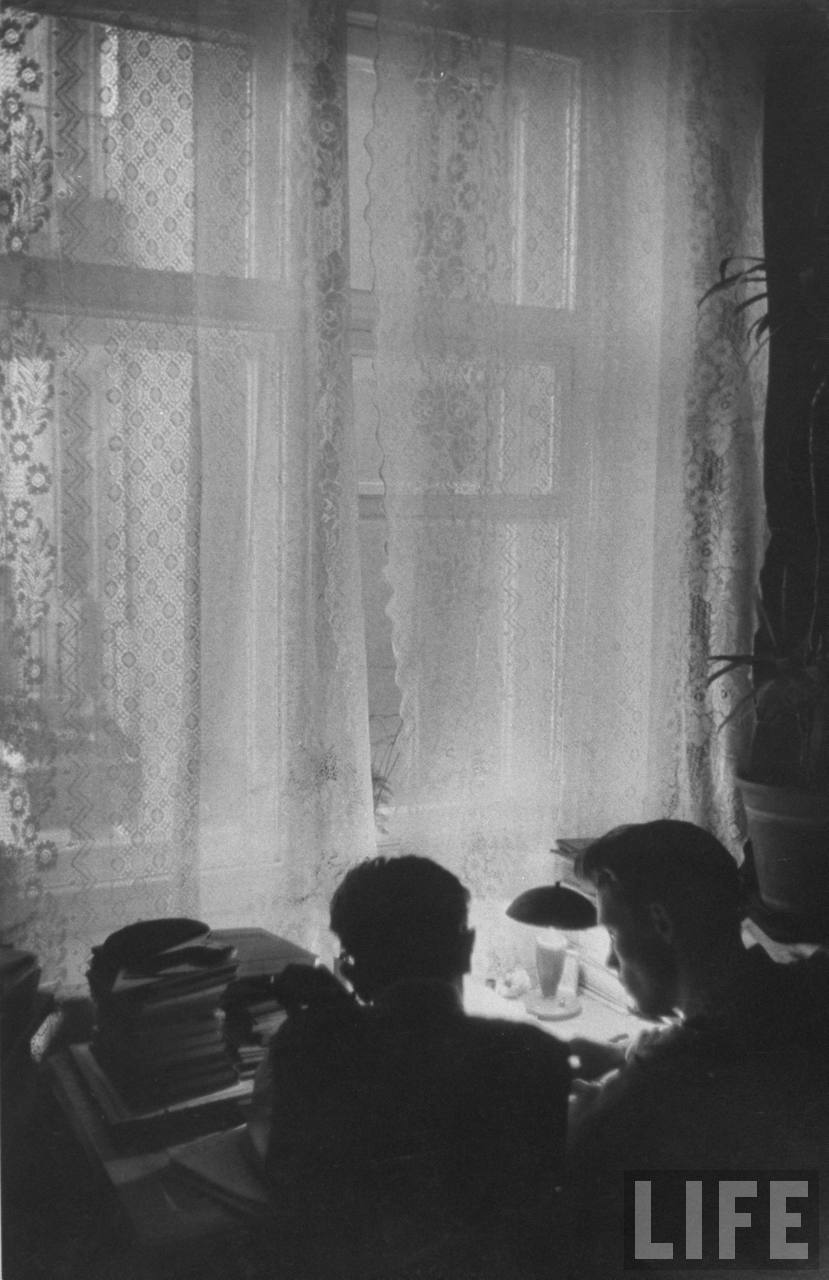
High school student Alexei Kutzkov and a friend studying together. ©Time.Howard Sochurek. Continue to part II.
Continue reading →Jimmy Carter-ing at Lunch
Some day I will go out to get lunch and come back dead or it least in a “critical but stable” condition. That’s because unlike the local lunch-reviewing icon who eats in the safety of Johnson County,I have to forage for food around the war zone a.k.a. Independence Ave. Its unpredictable mix of ethnicities, poverty and crime make every lunch trip an adventure.
I am not sure where I ate today. I can see the place on Google Street View (it’s the white storefront to the left of the barber shop).
View Larger Map
I think it was called “Yasmine Cafe” but I can’t find it in the Yellow Pages, Google and anywhere else. This trip started few days ago when I noticed a sign advertising shish-kebab while driving around looking for Mexican food. Today I came to work with a thought to try some middle-eastern cuisine. I drove to the place and walked in. Small clean room with a few tables and booths and no signs of food, decorated with a TV with some Arabic channel, few paintings and a sign that Muhammad is the messenger of Allah. Three guys hanging out in the dining room, watching TV. By the way, on Arabic TV the ticker at the bottom of the screen is moving in the opposite direction.
Small clean room with a few tables and booths and no signs of food, decorated with a TV with some Arabic channel, few paintings and a sign that Muhammad is the messenger of Allah. Three guys hanging out in the dining room, watching TV. By the way, on Arabic TV the ticker at the bottom of the screen is moving in the opposite direction.I started to feel like Jimmy Carter on his way to talk to Hamas, except that he is not Jewish. I asked one of the guys if there is any way I can get some food to go, so one of them went to the back of the building and retrieved a nice guy who could speak English. I asked about food again to which he smiled and said “Do you want to know the menu?” and proceeded to make up and recite the menu from the top of his head. I recognized some items and ordered shish-kabob, rice and salad, and he also offered to get me some soup just to try. I asked him how much this would cost and after minor hesitation he said that he will give all this food to me for 8 dollars. I watched Arab TV for about ten minutes, they were talking about NYSE, probably enjoying the oil prices. Then a group of men walked through the building and all greeted me with As-Salāmu `Alaykum, I actually knew the reply (wa `Alaykum As-Salām) but decided to limit myself to diplomatic shaking of hands. I got my food, paid and left.
The food was actually pretty good and there was so much that I split it in two decent size lunches. I also got a 16 inch flat bread to go with it. I didn’t really like the eggplant soup, it was to acidic for my taste. The rice had some vegetables in it and even a few raisins and was light and tasty. Kebabs were grilled and meaty. Salad had cucumbers and lettuce, nothing weird. If anything, I expected the food to be a little more spicy, but a co-worker who spent some time in the Middle East confirmed that it was pretty close to authentic.
I am not sure if I’d recommend this place with no menu and all, try it at your own risk. I am still alive so food quality is not substandard. So just like Jimmy Carter, I am not only eating lunch, I am also improving Jewish-Arab relations, one kebab at a time.
Continue reading →Complaints One Floor Up
Selective Memory
It always bugs me when people in their desire to call someone a war criminal, to point out crimes against humanity, to pile on international statutes under which said person should be prosecuted, somehow fail to bring up the fact that said criminal is just another one in the long line of many who preceded him and probably will follow him in the future. I understand that this sad fact is not a justification for someone’s breaking laws and moral codes but at the same time what’s the point of plucking an evildoer from a lineup other than personal feeling of hatred.
For the record I don’t care what happens to George W. Bush, but my feeling is that there will not be any kind of investigation or charge against him, since there are other ex-presidents still alive who are just as guilty, and many of the “public servants” who signed off on the criminal policies and actions are still happily serving in the government. I am often disputed when I point out that America used torture, deceit, murder, bribes, blackmail and other means to achieve it’s geopolitical goals, and many times I hear “we are better than that”. I would argue that there isn’t a country in the world which inflicted more lasting damage both economical and humanitarian in the past 50 years than the United States. Many modern states are still struggling to overcome what a few CIA officers and a few million dollars did to them in order to control their ideology or resources. These covert and overt actions happened under beloved presidents like Ike and JFK as well as under the hated ones like Nixon and G.W.Bush.
I am not a historian but I can copy,paste and link with the best of them, so I will write a post or two about history that somehow touched my life and maybe point out a few facts that your selective memory may have left behind.
Chile
 I bet everyone who grew up in the USSR during the 1970’s knows about comrade Luis Corvalán – “the heroic leader” of the Chilean communist party (who lived in exile in Moscow) and Victor Jara – a brave patriot and a famous singer who was murdered by the bloody Pinochet’s Junta backed by the no-less-bloody military-industrial complex in the USA. I wrote before about the Soviet propaganda and how most people tuned it out, but in this case many years later I found out the the Soviets weren’t far from the truth – the United States financed and executed an operation to depose a democratically elected president Salvador Allende and created favorable conditions for the military coup. The ironic fact was that Chile was an established democracy since 1932 and the CIA had a lot of trouble influencing Chilean democratic politicians and military. After the coup the US kept members of junta on the payroll and continued to support the junta until the end.
I bet everyone who grew up in the USSR during the 1970’s knows about comrade Luis Corvalán – “the heroic leader” of the Chilean communist party (who lived in exile in Moscow) and Victor Jara – a brave patriot and a famous singer who was murdered by the bloody Pinochet’s Junta backed by the no-less-bloody military-industrial complex in the USA. I wrote before about the Soviet propaganda and how most people tuned it out, but in this case many years later I found out the the Soviets weren’t far from the truth – the United States financed and executed an operation to depose a democratically elected president Salvador Allende and created favorable conditions for the military coup. The ironic fact was that Chile was an established democracy since 1932 and the CIA had a lot of trouble influencing Chilean democratic politicians and military. After the coup the US kept members of junta on the payroll and continued to support the junta until the end.
“There is no doubt”, the agency (CIA) confessed in a statement to Congress after the cold war ended, “that some CIA contacts were actively engaged in committing and covering up serious human rights abuses.” Chief among them was Colonel Manuel Contreras, the head of the Chilean intelligence service under Pinochet. He became a paid CIA agent and met with senior CIA officials in Virginia two years after the coup, at a time when the agency reported that he was personally responsible for thousands of cases of murder and torture in Chile. Contreras distinguished himself with the singular act of terror: the 1976 assassination of Orlando Letelier , who had been Allende’s ambassador to the United States, and an American aide Ronni Moffitt. They were killed by a car bomb fourteen blocks from the white house. Contreras then blackmailed the United States by threatening to tell the world about his relationship with the CIA, and blocked his extradition and trial for the murder*.
United States’ actions in Chile were personally ordered and controlled by president Nixon and previously (in 1962) by president Kennedy. They resulted in 3,197 deaths or disappearances between September 1973 and March 1990 at the hands of state agents. Of these, 1,102 were classified as “disappearances” and 2,095 as deaths. The American position was summarized by Henry Kissinger:“I don’t see why we need to stand by and watch a country go communist due to the irresponsibility of its own people. The issues are much too important for the Chilean voters to be left to decide for themselves.”
Incidentally there was some talk about charging Kissinger with crimes against the people of Chile but it looks like he will probably peacefully die here and will be given a state funeral when his time comes.
Once in a while my childhood memories about Chile come back: unbelievably, a sister-in-law of my childhood friend is now a top model and actress in Chile (I remember her when she was my daughter’s age); in a movie I recently watched “Blame it on Fidel” the parents of the main character become communists and active supporters of Allende in 1970’s France. My favorite quote from the movie is when the child who hears her parents talk about “group solidarity” and “sheep behavior” asks what’s the difference between the two. I still can’t answer that.
The movie also reminded me of the song El pueblo unido jamás será vencido which I often heard when I was a kid, I think it was even translated in Russian. It became an anthem of resistance in Chile and around the world.
*quoted from: “Legacy of Ashes: The History of the CIA”
Continue reading →